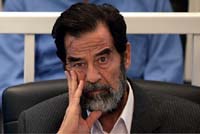Saddam, six others charged with genocide for crackdown against the Kurds
Iraqi authorities charged Saddam Hussein with genocide Tuesday, accusing him of trying to exterminate the Kurds in a 1980s campaign that killed an estimated 100,000 the first move to prosecute him for the major human rights violations which the U.S. cited to help justify its invasion.

The former Iraqi dictator returns to court Wednesday in his current 6-month-old trial, facing a possible death sentence if convicted in the killings of more than 140 Shiites. Defense lawyer Khamis al-Obeidi said Saddam plans to make a statement to the court during the session.
But that case involves a relatively small number of victims, and the scope of the allegation pales in comparison to the crackdown against the Kurds or the suppression of the Shiite uprising in the south in 1991.
Investigative judge Raid Juhi told reporters he submitted the new case against Saddam and six co-defendants to the Iraqi High Tribunal, a legal step that is the equivalent of an indictment under Iraqi law.
His move paves the way for a second trial, which could begin any time after 45 days. Juhi said charges also include crimes against humanity.
Legal experts said the decision to accuse Saddam of genocide is controversial because the charge is difficult to prove. An international convention following the Nazi Holocaust of World War II defined genocide as an effort "to destroy, in whole or in part, a national, ethnical, racial or religious group", reports AP.
According to Los Angeles Times, Iraq's tribunal announced today that it has completed an investigation into deposed leader Saddam Hussein's involvement in a series of 1988 military operations that killed more than 100,000 Kurds and could file formal charges as early as Wednesday.
Six aides, including Hussein's cousin, Ali Hassan Majid, also known as "Chemical Ali, would also stand trial for the Anfal campaign, which included mustard gas and nerve agent attacks against civilian populations.
Iraqi officials said they had reviewed an array of documents from Hussein's Baathist Party and thousands of witness statements in preparation for the Anfal trial. Investigators also exhumed mass graves and tested corpses for traces of banned chemical agents.
The Anfal campaign involved eight military operations, including a poison gas attack against the Kurdish town of Halabja, where 5,000 people died. Civilians comprised the bulk of the campaign's casualties, leading some legal experts to push for genocide prosecutions against former Baathist regime leaders.
O.Ch.
Subscribe to Pravda.Ru Telegram channel, Facebook, RSS!




